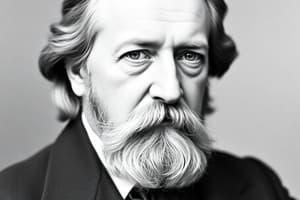Podcast
Questions and Answers
Richard Wagner was a French composer and playwright.
Richard Wagner was a French composer and playwright.
False (B)
Wagner's father, Friedrich, was a professional musician.
Wagner's father, Friedrich, was a professional musician.
False (B)
Wagner studied under Ludwig Beethoven during his formative years.
Wagner studied under Ludwig Beethoven during his formative years.
False (B)
The concept of 'Gesamtkunstwerk' aimed to integrate all art forms except music.
The concept of 'Gesamtkunstwerk' aimed to integrate all art forms except music.
Wagner's genre 'opera-drama' focused solely on music without any theatrical aspects.
Wagner's genre 'opera-drama' focused solely on music without any theatrical aspects.
Wagner's key operas are known for being just traditional operas without any theatrical innovation.
Wagner's key operas are known for being just traditional operas without any theatrical innovation.
The opera 'Der Fliegende Holländer' tells the tale of a sailor who is doomed to sail forever after breaking a promise to his wife.
The opera 'Der Fliegende Holländer' tells the tale of a sailor who is doomed to sail forever after breaking a promise to his wife.
Tannhäuser is an opera that explores the conflict between love and military duty.
Tannhäuser is an opera that explores the conflict between love and military duty.
In 'Lohengrin', the knight who helps defend a kingdom demands that his identity remains known to all.
In 'Lohengrin', the knight who helps defend a kingdom demands that his identity remains known to all.
Tristan und Isolde highlights a deep emotional bond between its two protagonists and the love that is freely accepted by all.
Tristan und Isolde highlights a deep emotional bond between its two protagonists and the love that is freely accepted by all.
Die Meistersinger von Nürnberg touches upon themes of art, friendship, and community in a tragic setting.
Die Meistersinger von Nürnberg touches upon themes of art, friendship, and community in a tragic setting.
Der Ring des Nibelungen is often referred to as 'The Ring' and consists of three operas.
Der Ring des Nibelungen is often referred to as 'The Ring' and consists of three operas.
Flashcards are hidden until you start studying
Study Notes
Richard Wagner: A Composer's Journey through Opera and Drama
Richard Wagner (1813-1883) was a German composer and playwright who became one of the most influential figures in the world of classical music. His groundbreaking works in the genre of opera-drama have left an indelible mark on the cultural landscape, shaping the course of Western art for centuries to come.
Early Life and Influences
Born in Leipzig, Wagner grew up in a family with a strong musical background. His father, Friedrich, was a lawyer and amateur clarinetist, while his mother, Johanna, was an amateur musician. Wagner received his initial musical training from his father and then went on to study under Ludwig Günther, a violinist and pedagogue. His formative years were marked by a fascination with the works of Shakespeare and Goethe, as well as the operas of Ludwig van Beethoven and Giacomo Meyerbeer.
The Birth of Opera-Drama
In the 1840s, Wagner began to develop a new approach to opera, which he called "Gesamtkunstwerk," or "total work of art." This concept aimed to integrate all art forms into a unified whole, resulting in a new genre Wagner referred to as "opera-drama." At the heart of this genre lay the fusion of music, drama, poetry, and spectacle, producing works that were akin to theatrical masterpieces rather than mere operas.
Key Operas
Wagner's most celebrated works, which established his legacy as a composer-dramatist, include:
- Der Fliegende Holländer (The Flying Dutchman) (1843): This opera tells the tale of a doomed sailor who, after promising to return to his wife, has been cursed to sail forever.
- Tannhäuser (Tannhäuser) (1845): Based on the life of the medieval poet Tannhäuser, this opera explores the conflict between love and religious devotion.
- Lohengrin (1850): A tragic romance set against the backdrop of the Holy Roman Empire, this opera portrays the story of a knight who agrees to help defend a kingdom but in exchange demands that his identity remains a secret.
- Tristan und Isolde (1857): This opera, considered by many to be Wagner's most profound work, highlights the deep emotional bond between its two protagonists and the forbidden love that consumes them.
- Die Meistersinger von Nürnberg (The Mastersingers of Nürnberg) (1868): A comic opera that touches upon themes of art, friendship, and community, it is often considered Wagner's lightest and most accessible work.
- Der Ring des Nibelungen (The Ring of the Nibelung) (1876): This monumental four-opera cycle, often referred to simply as "The Ring," is Wagner's magnum opus and one of the greatest achievements in the history of Western music.
Legacy
Wagner's compositions, particularly his works for the stage, continue to captivate audiences and inspire artists worldwide. His concept of the Gesamtkunstwerk laid the groundwork for modern theater and opera production. The Ring cycle, in particular, has been the subject of countless interpretations, adaptations, and performance studies.
Moreover, Wagner's influence extends beyond music and theater. His ideas have been taken up by philosophers, writers, and political thinkers, and continue to shape the cultural landscape of the modern world.
In conclusion, Richard Wagner was a true innovator who, through his groundbreaking operas, forever changed the course of Western classical music. His works continue to inspire and captivate audiences, while his legacy remains an integral part of the history of Western art.
Studying That Suits You
Use AI to generate personalized quizzes and flashcards to suit your learning preferences.




